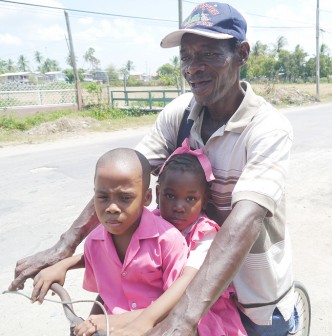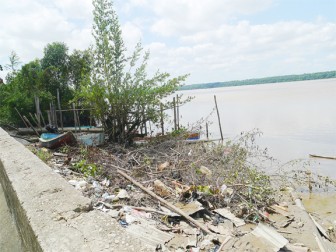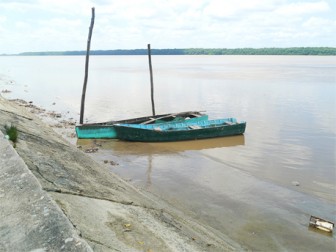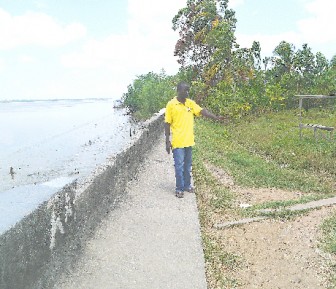Story and photos by Shabna Ullah
Islington, the first village on the East Bank of Berbice located next to New Amsterdam was described by residents as the “forgotten village” or a “depressed community.”
It is a small village, which is home to residents of various ethnicities, and deplorable streets and drains. However, the biggest problem for residents is that it faces threat from erosion. They are afraid that if steps are not taken early the “sea would take over the village… Since the seawall was built it was never maintained and it is deteriorating.”

In spite of these problems, those who live there still say that “this village peaceful and quiet… Everybody looks out for each other. No one plays loud music to disturb the neighbours.”
The village has shops, a mini-supermarket, a beekeeping business, an internet café, a chicken farm and two snackettes along the roadside where people, including schoolchildren would shop.
There is also a sluice with a little hut nearby for the operator. Close to that is the spot where the old marketing centre once stood. The centre was vandalized by people who stripped the building almost completely, and all that remains is a large concrete floor, a small concrete water trestle and a part of the washroom.
Residents said persons offered to purchase the centre but “government did not want to sell or even rent it. That was the main market for people from Mara and other outlying villages and from New Amsterdam.”
Just a few residents in the village own landline telephones and some said they applied a long time ago and still cannot get through. They have to use cell phones and find that very costly. Glendon Holder was returning home from the New Amsterdam market where he sells sometimes. His main job is building construction but when jobs are not available he does vending.

He has been living in the village all his life and described the inhabitants as very co-operative. “If somebody from the other street gat some load to fetch in everybody would go and help. We don’t have fights and problems here. Everybody does look out for one another.”
It seemed quite strange the way the village was laid out with Overwinning being located on the opposite side.
Residents benefit from the playground which they said needs upgrading, as well as a nursery school and primary school that houses a secondary department at Overwinning.
At the time of this newspaper’s visit, students from the primary school were on their lunch break, and had gone out to purchase items from the roadside snackettes.
A few parents also went to the nursery school to
pick up their children. Dennis Chesney who hails from another village had dropped his children back at school after they went home for lunch.

On his way home he was giving two students from the nursery school a lift home. This newspaper caught up with him when he stopped at a snackette belonging to Joann for the students to purchase snacks.
The woman said she only recently started the business of selling. Before that she was involved in knitting and earned a small amount. But she continues to knit while waiting on customers. She has been living in the area for the past 15 years after moving from Kwakwani, Berbice River.
Over at T. Persaud and Daughters Supermarket, Tirmattie Persaud was relaxing in front of her businessplace with her daughters and granddaughter. She established the business five years ago and apart
from groceries she stocks general items as well. She had just finishing attending to a customer, Pearlene Clement who was also sitting there chatting with her.

Clement, a housewife moved from Canje after she got married 17 years ago. Although she finds the residents friendly and the village quiet, she still loves Canje more.
Erosion
Residents called on the authorities to protect the sea wall with boulders before it collapses. They told the Sunday Stabroek that “government placed boulders at the sea defence at Glasgow Village because the whole place
break away back in the ’80s.”

According to them, the land there had 25 rods and now it is only left with six rods. Government placed the boulders to save it from washing away further while the residents had to be relocated to other villages.
Residents do not want to wait until something like that happens and are pleading with the government to fix the sea defences before it is too late.
During a visit to the village, Devon Gilead, 32, who is engaged in beekeeping showed this newspaper some of the damage that had been done to the sea wall. Sections of it have started to lean and crack and we could feel the slope as we walked along. The “whole part is breaking away,” he said.
Persons living close to the sea were also concerned that when the tide is high water would pour through the cracks and flood their yards.

Devon Gilead stands near to a broken section of the sea wall as he points to the land that needs filling
Gilead also pointed to some areas in front of the sea wall that need to be “filled up and levelled because the water [that seeps under the sea wall] causes the land to be undermined.”
He recalled too that “two months ago during the high tide water came over the sea wall and flooded the entire village.” The flood also caused Gilead to suffer $4M losses after more than 50 hives were damaged. He was sad that the mangroves which serve as a protection for the sea defences were being destroyed, thus contributing to the erosion. His bees were also benefiting from the mangrove trees.
Persons from the Mangrove Restoration Committee had inspected the area and concluded that “mangrove cannot grow in this area because here is too high.” But pointing to a number of new plants he said, “look at this, nature did its work and these mangroves came here by natural growth…”
Other residents told the Sunday Stabroek that they had complained several times to the authorities about the erosion but “they are not doing anything. They does wait until something happen then they does come you know.”

Some of the residents earn their living by fishing and some of the boats that they use to ply their trade were moored along the shore. It was observed that some of the mangrove trees had been chopped down to accommodate the boats.
Residents would also spread out shrimp on sections of the sea wall and after they have dried, they would be packaged and sold wholesale to shopowners.
Infrastructure
Residents are tired of the deplorable conditions of the roads and the poor drainage. They said that as far as they can recall the village had the same “narrow mud streets.”
“The streets are also very dark and if anyone gets sick and you don’t have money to hire a taxi you can’t take your patients out,” they said.

They noted that there is a drain at the back of the village that is “not solving any purpose and should be filled up and the main drains should be dug properly.” Residents also said that the burial ground needs to be cleaned.
Jennifer Vandenburg who was born and grew up in the village told this newspaper, “This place is the same since I know it. No improvement and when we get high tide the sea water come as high as my veranda [of flat concrete house].”
She lamented too that “we have no proper drainage. Right now if this house wasn’t me house ah woulda move out from here because I fed-up.”
She also said that the authorities are collecting “rates and taxes every year and they are not doing anything. And the water company cut the streets to install pipelines and they are not fixed back properly.”
Besides, she was concerned that the “water would cut off for more than one day but no one would give us notice beforehand. I feel that out of courtesy they should put a notice on TV. When they want to cut people [water] off if they don’t pay up their bills then they would go around and announce.”

The outspoken Vandenburg said too, “This village is like a ghost town,” while lashing out at residents from nearby villages and a few from Islington who were engaged in petty theft. She said persons went into her yard one night and stole her new bicycle, leaving two old ones behind. She was alerted by a noise but did not check immediately. By the time she did she saw her gate was open and the bicycle missing.
She said that the “internet [café] had a lot of computers but thieves broke in and stole most of them. The internet was assisting the students but now it is hardly operating and the students have to go to New Amsterdam to do assignments.”
She is one of the few persons in the village to own a landline telephone. She lived briefly in New Amsterdam and had applied for the line to be transferred. “But,” she lamented, “I had to wait 12 years to get it.”
She said the community is also affected by “constant blackouts but the [electricity] bills are very high.”
This newspaper caught up with 63-year-old Davidson Bipta, an estate pensioner who assists in running a business from his home. He was born in Overwinning.
He feels that the authorities were not spending money to develop the area. Residents had asked a former regional official for a tube to install in a drain through self-help work, but they never received it.









